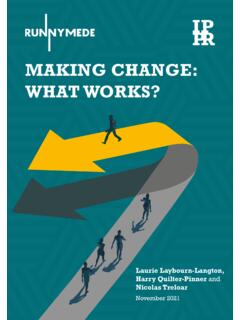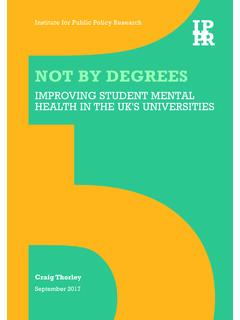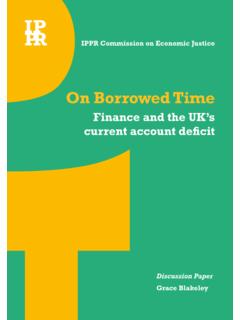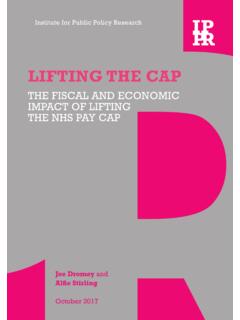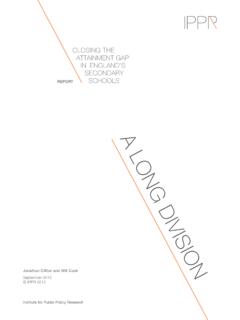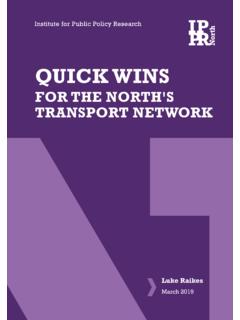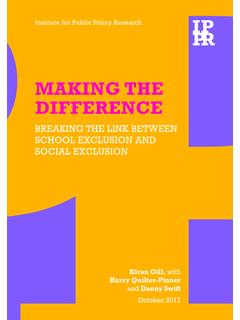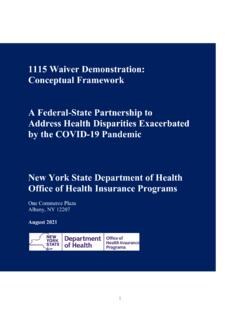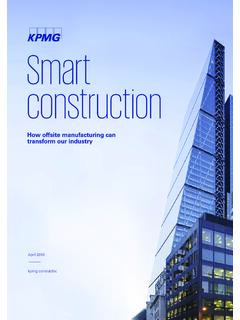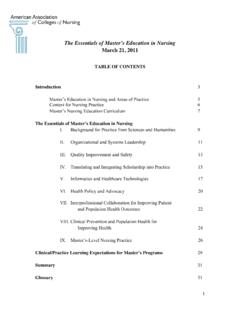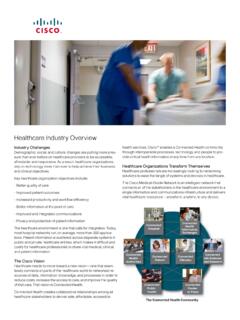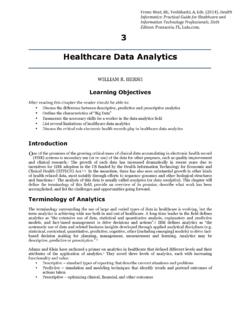Transcription of TRANSFORMING THE ECONOMY AFTER COVID-19
1 Institute for Public Policy ResearchTRANSFORMING THE ECONOMY AFTER covid -19A CLEAN, FAIR AND RESILIENT RECOVERYC arsten Jung and Luke MurphyJuly 2020 ABOUT IPPRIPPR, the Institute for Public Policy Research, is the UK s leading progressive think tank. We are an independent charitable organisation with our main offices in London. IPPR North, IPPR s dedicated think tank for the North of England, operates out of offices in Manchester and Newcastle, and IPPR Scotland, our dedicated think tank for Scotland, is based in purpose is to conduct and promote research into, and the education of the public in, the economic, social and political sciences, science and technology, the voluntary sector and social enterprise, public services, and industry and 14 Buckingham Street London WC2N 6DF T: +44 (0)20 7470 6100 E: Registered charity no: 800065 (England and Wales), SC046557 (Scotland)This paper was first published in July 2020. IPPR 2020 The contents and opinions expressed in this paper are those of the authors progressive policy think tankIPPR | TRANSFORMING the ECONOMY AFTER covid 19 A clean, fair and resilient recovery1 Summary.
2 31. Introduction ..6 Recovering from COVID-19 ..6 Implications for the climate and nature crisis of COVID-19 ..6 The worst jobs crisis in a generation ..7 Rising inequality ..8A clean, fair and resilient recovery for a transformed ECONOMY ..82. A recovery for economic transformation ..10 Recovery packages so far ..11 Principles for a clean, fair and resilient recovery ..12 Principles for selecting projects and programmes ..133. Priority projects and programmes for a clean, fair and resilient recovery ..15 Priority areas ..16 Priority area 1: Low-carbon housing ..17 Priority area 2: Nature restoration ..18 Priority area 3: Social infrastructure ..21 Priority area 4: Transport infrastructure ..224. Creating jobs and levelling-up ..24 The risk of large increases in unemployment ..24 How a clean and resilient recovery can address rising unemployment and support the levelling-up agenda ..265. Recommendations making it happen ..31An investment-led recovery ..31 References ..37 Annex.
3 42 CONTENTS2 IPPR | TRANSFORMING the ECONOMY AFTER covid 19 A clean, fair and resilient recoveryDownloadThis document is available to download as a free PDF and in other formats at: you are using this document in your own writing, our preferred citation is: Jung C and Murphy L (2020) TRANSFORMING the ECONOMY AFTER covid 19: A clean, fair and resilient recovery, IPPR. to shareThis document is published under a creative commons licence: Attribution-NonCommercial-NoDerivs UK For commercial use, please contact THE AUTHORS Carsten Jung is a senior economist at Murphy is head of the Environmental Justice Commission and associate director for the energy, climate, housing and infrastructure team at The authors would like to thank Joshua Emden, Shreya Nanda and Jonathan Webb for their research input to this paper and Russell Gunson, Sarah Longlands, and Carys Roberts for their valuable | TRANSFORMING the ECONOMY AFTER covid 19 A clean, fair and resilient recovery3 SUMMARYWe re at a historic moment.
4 The COVID-19 crisis could mark a turning point in the direction of the UK s ECONOMY and its efforts to address the climate and nature crisis. The ECONOMY is in need of significant intervention to halt rising and long-term unemployment, to protect and improve the quality of life of all citizens and protect and raise the living standards of low-income households and the responding, governments are presented with a choice: use this moment to build a stronger ECONOMY that is cleaner, fairer and more resilient, or further entrench an old-fashioned ECONOMY driven by fossil-fuels and debt-laden consumption. An ECONOMY which, at present, is failing to improve the quality of life and wellbeing for the majority, and which must be consigned to the this paper, we argue for the former: for an investment-led economic recovery focused on job-creation and creating opportunity across the country, decarbonisation and restoring nature, and tackling inequality. Too often, these goals, and that of building a strong ECONOMY , are presented as being in conflict with each other.
5 But in reality, they can and must be achieved together and this must begin with the economic recovery packages following FINDINGS This recession will be fundamentally different to the recession of 2008/09 that arose as a result of the global financial crash when unemployment peaked at per cent. Unemployment could rise by more than million, or 10 per cent. The severity of the economic crisis potentially the worst recession in three centuries and the worst jobs crisis for a generation demands a bold response from the government. In responding to this crisis, the government has the opportunity not just to tackle the immediate economic problems but to transform the UK ECONOMY AFTER COVID-19 , creating jobs, addressing the climate and nature crisis and tackling inequality. It will require the government to take a bold approach, delivering an investment-led recovery and implementing a suite of bold measures. Such a programme could together create million jobs over the next decade.
6 This means clean recovery investments could generate about three quarters of the jobs expected to be lost during the COVID-19 crisis. These jobs would be broadly equally distributed throughout the UK. They include the following areas: -Low-carbon, home-related investments (energy efficiency, low-carbon heat and zero carbon social homebuilding) could generate more than 560,000 jobs. -Closing the huge gaps in social care and in health care could create up to 700,000 jobs by 2030. Jobs in these areas fulfil pressing social needs and at the same time are in line with a low-emission ECONOMY . -Investing in better public transport such as rail and electric bus services as well as sustainable urban transport can be a jobs locomotive. Investments in these areas could help generate more than 230,000 jobs. 4 IPPR | TRANSFORMING the ECONOMY AFTER covid 19 A clean, fair and resilient recovery6 An investment-led recovery is both necessary and affordable. Interest rates are currently so low that even a doubling of the UK s debt would still mean the Treasury would pay less to service this debt, as a share of tax receipts, than at almost any other time since 1950.
7 In the medium term, AFTER the recovery is achieved, public finances will need to be stabilised through a clear fiscal framework and fair taxation. Moreover, the risks of inaction far outweigh the risks of action. The climate and nature crisis is the largest existential threat to our way of life and must be a priority for investment. Public investment must be accompanied by a package of policies including incentives and regulatory measures to provide market signals and help lever in private investment and spending. These include, for example, a firm commitment to phasing out petrol and diesel vehicles by 2030 or tighter energy efficiency standards for the nation s recommend that the UK government implements a range of bold measures to transform the ECONOMY AFTER COVID-19 , and deliver a clean, fair and resilient recovery. The proposals and recommendations outlined in this paper are for the UK government, but many could also be applied at the devolved investments and programmes Homes and buildings: Deliver a large-scale energy efficiency programme to significantly raise the energy efficiency of the nation s homes and buildings and drive an ambitious low-carbon heat programme preparing every home and building for the transition to heat pumps, district heating or hydrogen.
8 Investment must be targeted at fuel poor households and social homes first. Embark upon a mass zero carbon social home building programme delivering high energy efficient homes, creating jobs and tackling the shortage of affordable homes. Nature restoration: Invest in tree planting and peatland restoration across the country. This should include the expansion of green spaces including parklands, with a particular focus on deprived areas without current access to green space to ensure fairness and justice is at the heart of these schemes. Transport infrastructure: Invest in electric vehicle uptake and charging infrastructure to significantly ramp-up the uptake of low carbon travel. Support measures should be targeted at poorer households who are dependent on road travel but might not have the resources to switch. Invest to significantly expand low carbon public transport infrastructure by bringing forward investment in rail and electric buses and bus networks. Such investment, in buses in particular, will benefit poorer households who are disproportionately reliant on the bus network for their travel needs.
9 Industry: Provide financial support mechanisms for Carbon Capture and Storage (CCS) and hydrogen clusters which will have a critical role in delivering a net zero ECONOMY . Upfront investment is required by government for the successful development of this industry and it will provide a boost to the local economies where these sectors are based. Social infrastructure: Invest in adult social care which is an essential public service and a growing part of our ECONOMY . Invest in the National health Service which the COVID-19 crisis has already exposed as being under significant strain. IPPR | TRANSFORMING the ECONOMY AFTER covid 19 A clean, fair and resilient recovery5 Other areas for investment Digital Infrastructure: Invest in broadband to ensure there is adequate connectivity across the country and lock-in the positive behavioural changes seen since the onset of COVID-19 . Energy generation, storage, and distribution: Invest in the extension and modernisation of the electricity grid.
10 This will require investment in the production of zero carbon energy, energy storage infrastructure and interconnection. Research and development: Investment in research and development to driving innovation, supporting new start-ups and small and medium-sized enterprises, with consideration of equity stakes for government to share the proceeds of success. Education, skills and training: The recovery plan and shift to the zero-carbon ECONOMY will inevitably require new skills and widespread training initiatives. This will demand a number of particular initiatives including: -a Right Start Guarantee comprised of three bold measures i. the reform of welfare support for young people ii. Reform of the Apprenticeship Levy iii. the creation of Right Start Fund to support those young people that are not ready for the labour market or apprenticeships -a Just Transition Fund to be established as part of regional economic development funding to help the drive towards a net zero ECONOMY and to ensure those negatively disrupted are given the resources and support to succeed in the future.
